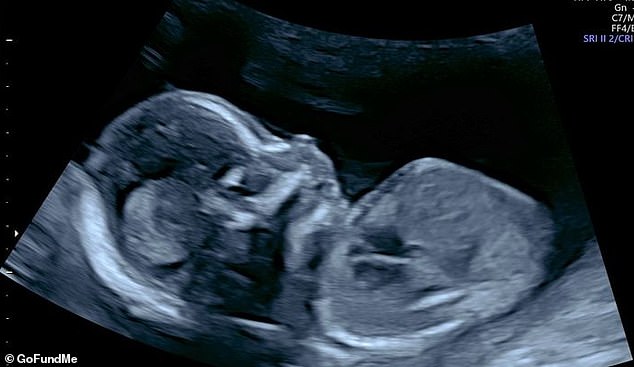A young mother has revealed the devastating moment her unborn baby was diagnosed with a rare, life-threatening heart defect midway through her pregnancy.
Shayna Hulm, 33, went for her 20-week ultrasound (sometimes called an anatomy or anomaly scan) at Logan Hospital, south of Brisbane, on May 18.
The 45-minute scan examines the baby’s bones, heart, brain, spinal cord, face, kidneys and abdomen in detail and allows the sonographer to detect 11 rare diseases.
Ms Hulm told the Daily Mail Australia she sensed something was wrong when the scan took almost four hours to complete.
“We knew something was going on, but sonographers aren’t allowed to say anything because they’re not doctors,” Hulm said.
“They spent about two and a half hours trying to get good photos and videos of his heart.”
The expectant mother of three was referred to Logan Maternity Fetal Clinic and within a week had a more thorough scan carried out by an experienced sonographer.
Immediately after the ultrasound, a cardiologist told Ms Hulm and her partner Jonnie that their baby Hector had dextrotransposition of the great arteries.
At her 20-week ultrasound, Shayna Hulm was told that her baby Hector had a rare heart defect known as dextrotransposition of the great arteries.
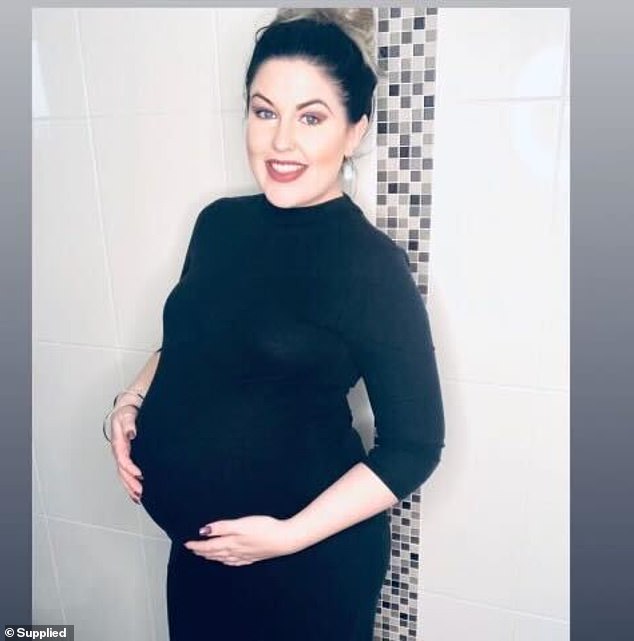
Mrs Hulm (pictured) was told her baby would need life-saving open-heart surgery once born.
Dextrotransposition of the great arteries (D-TGA) is a rare and serious congenital heart defect in which the two main arteries leading from the heart are reversed.
In D-TGA, the pulmonary artery connects to the left lower heart chamber and the aorta connects to the right lower heart chamber.
This means that oxygen-poor blood returns to the body without passing through the lungs, while oxygen-rich blood returns directly to the lungs without being pumped to the rest of the body.
Doctors informed Ms Hulm that the condition would not affect Hector while he was in the womb, as his blood and oxygen supply came from his placenta.
However, once Hector is born he will need open heart surgery to correct the defects.
Hector also does not have the standard hole in his heart, which is a natural and essential way for fetuses to prevent blood from reaching their lungs.
Once the baby is born and begins using its lungs, the hole usually closes within the first day.
Ms Hulm said there were two options to correct the heart defect, which will be determined by the result of her 38-week ultrasound.
She explained that if a small hole develops in Hector’s heart, doctors will try to enlarge it using a balloon through the umbilical cord and she will have the option between a Caesarean section or a natural birth.
Hector will then be given medication to help his heart function and, if successful, will undergo open-heart surgery two to three weeks later at Queensland Children’s Hospital in Brisbane.
Your open heart surgery will also be done at Brisbane Children’s Hospital if you develop a large enough hole while in the womb.
If Hector does not develop a hole in his heart while he is in the womb, doctors will deliver him by Caesarean section and operate on him immediately at the Mater Hospital.
“What will happen when he is born is still unknown,” Hulm said.
‘We still don’t know if he will be operated on as soon as he is born or if we will have to wait two or three weeks to do the artery exchange, which is major heart surgery.
“But we have been told that he will be taken away immediately and it could be several days before we can see him.”
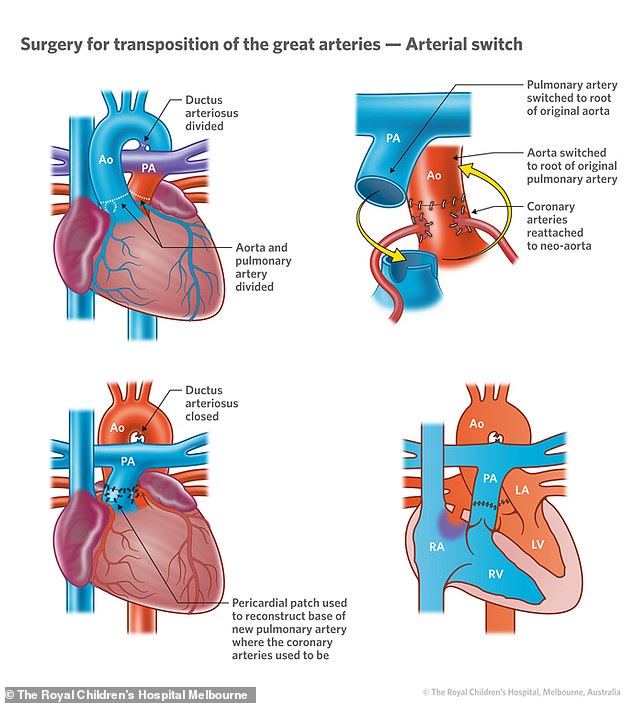
Dextrotransposition of the great arteries (D-TGA) is a rare and serious congenital heart defect in which the main arteries (pulmonary and aorta) are reversed.
Either way, Hector has a long road to recovery and could spend up to six months in the hospital, which will put significant emotional and financial strain on the family.
Ms Hulm owns a small beauty salon and has been unable to work because she has been on bed rest for most of her pregnancy.
Her partner, Jonnie, works on oil rigs and is usually away for two to four weeks.
She said if Jonnie misses Fly-Out day, the family will go weeks without income, however, if he goes to work, he will potentially miss Hector’s birth and surgery.
The couple also have two sons, Darius, 13, and Darren, four, who are eagerly awaiting their little brother.
Mrs. Hulm started a GoFundMe fundraising page to help support their family financially, since the couple cannot work and will have to pay for travel, parking and accommodation expenses while Hector is in the hospital.
“My income has already been affected… and I can’t stay at the hospital full time while Hector is a patient,” Hulm said.
‘We are currently trying to manage what travel, parking and lodging will look like while I recover from my C-section and have a baby who can’t leave the NICU for months.
“Unfortunately, we are not entitled to any government assistance for parking or accommodation, let alone continuing to care for and support our two children at home.”
Ms Hulm called it “madness” to have to pay up to $40 a day for parking, especially for people who have a family member hospitalised for an extended period.
She and her partner are applying for a parking subsidy, but may not be eligible as they live in a “grey zone” between 30 and 50 kilometres from the hospital.
“I thought if you had a child or were in the hospital for a long time, parking would definitely be subsidized,” Hulm said.
“I can’t imagine that if you’re not eligible for the subsidy, you’re going to have to pay $40 a day for six or eight months. That’s crazy, especially if you can’t work.”
Despite Hector’s heartbreaking diagnosis and the uncertainty surrounding his medical journey, Ms Hulm said she and her partner have remained positive.
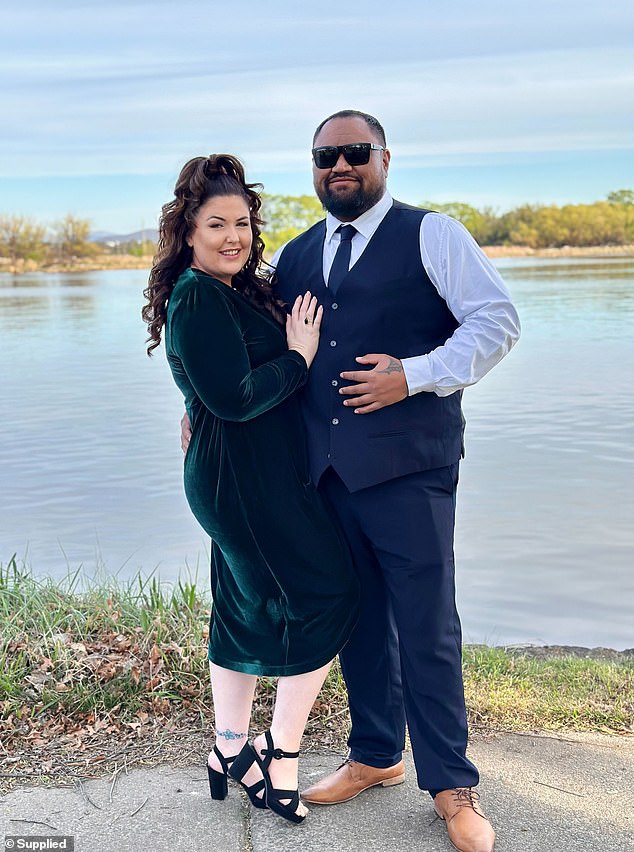
Mrs Hulm praised the support she received from her partner Jonnie (pictured) and the nurses and doctors at both Logan Hospital and the Mater Hospital.
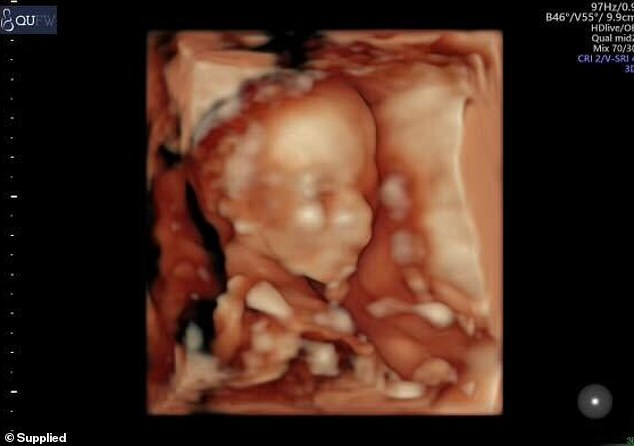
A GoFundMe page has been set up for the family to raise money to help cover travel, parking and lodging expenses once Hector (pictured) is born and in the hospital for treatment.
She also praised the support she has received from her partner Jonnie and the nurses and doctors at both Logan Hospital and the Mater Hospital.
“Honestly, my mind was so lost that without someone like him, I don’t know how I would have handled it,” Hulm said.
‘We are very, very lucky to have a very good support system from both Logan Hospital and the Mater Hospital. I was really comforted by their level of care.
“Being able to know so early and be able to prepare for what is coming is like a miracle.”
Mrs Hulm and her partner Jonnie have decided that Hector’s middle name will be Kururangi, the Maori word for hope.
“My partner was very adamant that she wanted her middle name to be Kururangi,” Hulm said.
‘When we found out he had this heart condition, the strength and attraction my partner felt towards the name was very strong.
“It’s a very special name to us and now it has even more meaning with the long journey ahead for our baby.”
At the time of writing, GoFundMe had received 15 donations totaling $6,845 and had a goal of raising $30,000.

